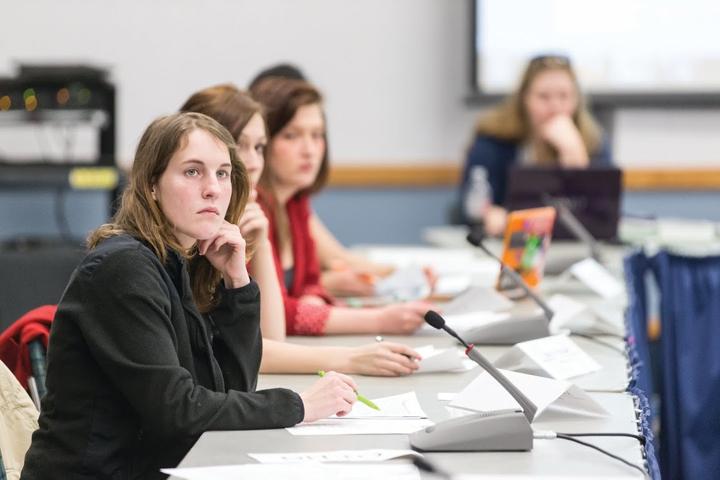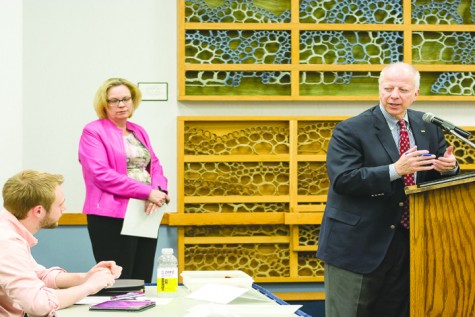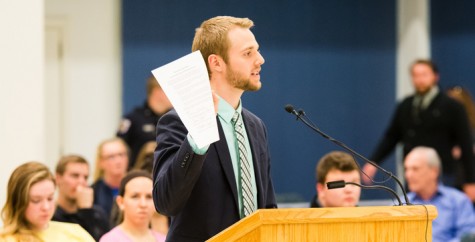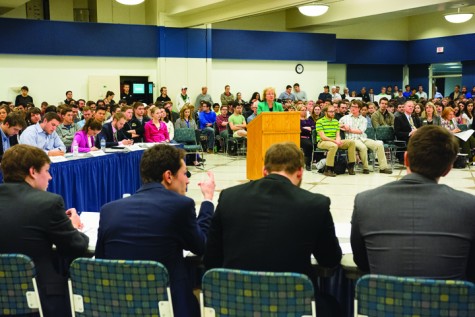Senate voices concerns with proposed alcohol laws
Student Senators listen to UND Vice President for Student Affairs Lori Reesor as she discusses proposed city ordinances that would limit activity surrounding Springfest. Photo by Chester Beltowski/The Dakota Student.
Controversy surrounding two new laws proposed by the Community and Campus Committee to Reduce High-Risk Alcohol Use to the Grand Forks City Council dominated the discussion at the most recent Student Senate meeting.
Vice President for Student Affairs Lori Reesor and University Police Department Chief Eric Plummer attended the meeting to address any concerns or questions senate members had.
The first ordinance would ban bars from offering three-for-one drink specials, unlimited drinks for a fixed price or drinking games.
The second law, which spurred most of the conversation, is a social host ordinance. It would cover what Reesor called, “a gap in the law” which would allow police to fine individuals who provided the venue for underage drinking to occur.
“The target of this is high school students and families,” Reesor said. “The standard is ‘you knew’, or ‘you should have known’. You don’t have to be present. For students, if your roommates serve underage people, you had to have known or should have known. We want you to have those conversations with your roommates. But you aren’t the target of this.”
The law, as proposed right now, doesn’t have a medical amnesty clause, because the authors believed state law would override city law if that situation arose. Reesor said they learned that would not be the case though. Both Reesor and Plummer stressed the importance of adding that.
“This is very narrowly tailored, and it’s very important to put a little medical amnesty clause in this,” Plummer said. “It’s not crafted to focus on any college group.”
A similar law in Moorhead, Minn. is used infrequently, with citations only being handed out five to six times a year, according to Plummer.
Student Sen. John Mitzel raised concerns about what will happen if there is a change in the UPD Chief position someday, and if the social host ordinance will have similarities to the noise ordinance, which can cover a wide set of circumstances.
“My fear is someday when Chief (Plummer) retires or moves somewhere, whatever it is, this has the potential to be enforced in incredibly broad circumstances,” Mitzel said.
Plummer said the ordinance contains many steps and several ways to get out of it, including intent and failure to take reasonable steps by the owners or renters of the property.
“We have an issue in this community that we have to address before someone ends up dead,” Plummer said.
Reesor echoed those sentiments.
“This is all about trust, and we are committed to doing that,” Reesor said. “We’re doing lots of education. My fear is to have to make that phone call to parents. I want to say we are trying to cover every nook and cranny that we can.”
At the end of the meeting, the senate entered into another discussion on the subject without Reesor and Plummer present. Most senators were in agreement that the law would be too broad and could be used in too many circumstances. Most also agreed there are too many issues with it right now, and want to see the issues figured out before it passes into law.
“This is a serious issue in our community and we can all agree on that,” Mitzel said. “I struggle to put this on the books before all the issues are worked out.”
The ordinances will be discussed again at the March 2 city council meeting.
SOFA
Senate passed one bill at the meeting, allocating $20,000 to fund the Student Organization Funding Agency (SOFA), which gives money to student organizations throughout the year. It is expected the $20,000 will fund the agency for the rest of the year.
Megan Hoffman is a staff writer for The Dakota Student. She can be reached at megan.hoffman@my.und.edu.











